#theatre criticism
Text
Agamemnon at Epidauros; Summer 2022
I can't tell you the first time I stepped foot onto the Ancient Theatre of Epidauros. I was too young to retain those details, but what I do remember is the magic that this space brings forth. To stand where performers stood thousands of years ago? It is an honour. Even as a child I could grasp that this theatre is a legacy being shared with me.

You don't have to be Hellenic or Mediterranean to feel a connection to this location, of course not. It is a stage that any theatre-lover is owed the opportunity to visit and adore. However, I believe that like any historic site, we must all be aware of the meaning it has to certain peoples. So when Ulrich Rasche of the German group, Residenztheater, brought his rendition of Agamemnon to the stage, I was angered.

We jest amongst friends about each other's histories, about the food or the music or the regalia. It is amongst friends, it is an excused mockery. Rasche holds no excuse for what he presented at Epidauros.
For those that do not know, you can drop a penny on the centre of the Epidauros amphitheatre stage and an audience member in the back row will hear it. Such is the natural acoustics of this historic site. And yet, Rasche disrespected Epidauros by using speakers. If only the discomfort of this performance ended there. It would be seen as a mistake, a lack of understanding, ignorance displayed towards this location.
If only. Before the play even began, a noticeable sign was being displayed, seemingly in protest. A handful of audience members were holding up a sheet with the words "He's a RAPIST" spray-painted onto it. Many audience members stood to take photos and shifted in their seats, curious to know more, concerned that their ticket was going to support someone unsavoury. To whom the statement was directed at, I never learnt, but my own doubts towards the justice surrounding Rasche biases my opinion of him to be lesser.
Unfortunately, the bitter taste in our mouths proved to only sour to greater extremes as an entire half hour of the performance had passed and all that had happened thus far was the performers donned in black walking laboriously across the stage as it rotated ever-so-slowly. A friend of mine leaned over and joked “Das Sound Machine,” the fictitious, German a cappella group from Pitch Perfect 2.


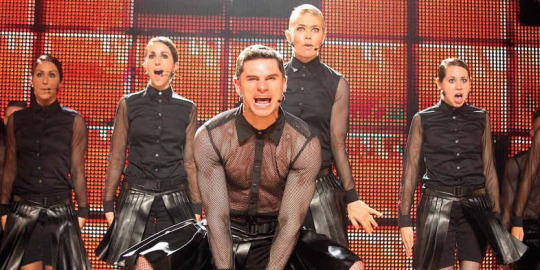
The audience members had begun to exit the theatre at this point, groups of five or more at a time. My own group of five found ourselves struggling to remain in our seats as flood lights were lit upon the rotating stage and blinded us. Considering this play was being performed in Greece, subtitles had been set up in Greek, and considering that most of the world does not speak Greek, a second set of subtitles displayed the English translation as well. Of course, it does not matter if the German spoken was being translated to other languages if the audience is too blinded to read the subtitles.
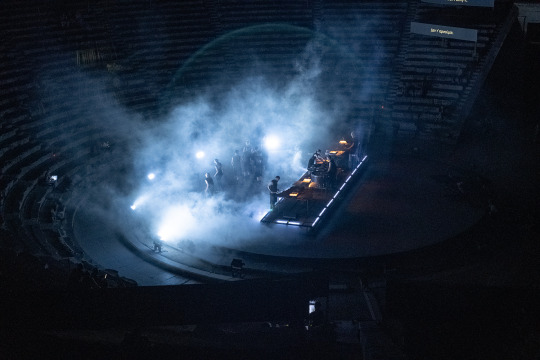
Finally, the breaking point, “He-le-na! He-le-na!” Eleni is a common name in Greek. Helen is a well-known name in English. Even Helena in German is not an incredibly rare name. Arguably, no one wants to hear their name being yelled in breathy screams, a guttural scratching of the soul. Yet, Rasche directed his cast to do exactly that. Sickening yells of Helen of Troy are heard again and again throughout the play. Not calls for justice, nor shouts of grief, simply growling. I wish I never have to use the word 'growling' to refer to human speech ever again; I never had the desire to do so initially, until this line: “He-le-na!”
I’d love to tell you that the play drastically improved after the first hour and a half which I had sat through, but it didn’t. The performers walked across the stage in their panting breaths, the percussion played quietly despite the aid of speakers and offered nothing more than distraction from the natural sounds of cicadas at night, and the lights continued to blink in and out of existence, choosing different portions of the audience to blind. The play was stagnant.

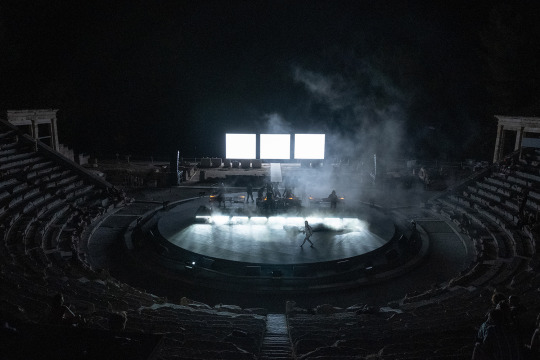
In an article released in the days prior to the opening night of Agamemnon, Rasche is quoted to have said “[s]omehow we give you back your poetry.” I spit at his words, and I leave a message for all those that have their art appropriated, do not tolerate anything less than utter respect. We are more than the messes foreigners make on our lands.
I did not stay until the final scene, and considering the nudity that was to come after two hours of heavy breathing, I can't say I'm sad I missed it. Clytemnestra stripping naked to lie with a man in no way offers some sort of conclusion that would ever replenish the time I spent in that seat, growing with anger and disappointment with every step the performers took. I will return to Epidauros in the near future, and I hope to see the respect it deserves.
To be offered the privilege and opportunity to join the thousands of years of performance history held in that space is something to be taken seriously. It is not a jest between friends. Rasche has no right ripping to tatters our legacy as Hellenes and theatre-lovers. Let Katerina Evagelatos, the artistic director of the Athens Festival at Epidauros, be more critical in what she allows and not excuse it as "push[ing] limits" of theatre "as artists."

Final words: An embarrassment of Greece and of Epidauros. Theatre pushed to become so niche that it transformed into the world's dullest audio book. The only struggle displayed was that of the audience. You could say the play "cannot leave you unmoved," because many, many audience members did move, in the direction of the exit.
[All images except the first image of Epidauros and the image of Das Sound Machine came from the official Athens Festival website.]
#epidaurus#theatre#amphitheatre#dark academia#drama academia#theatre academia#agamemnon#classics#classic literature#journalism#article#commentary#theatre commentary#theatre article#theatre criticism#criticism#Ancient Greece#Ancient Greek Theatre#classical theatre#Ulrich Rasche#Residenztheater#Appropriation#news article
2 notes
·
View notes
Text
On Alive In A Merciful Country by A. L. Kennedy, adapted for the stage by Sandra Strunz
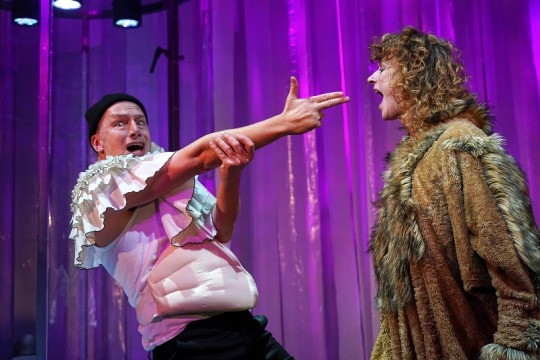
© Maurice Korbel
(#1149 ⋅ translation of my review on nachtkritik.de · cw: sexual violence · Munich, January 26, 2024) Wiebke Puls, as Anna, sprawls and stretches in a huge wicker chair, a mix of beach basket and bird's nest filled with blankets and cushions. She almost disappears in a plush jumpsuit that looks like manifest coziness (Costumes and Set: Sabine Kohlstedt). But Anna is tense, appearing anxious and angry. A man named Buster has left a manuscript at her door. And Buster is a Stiltskin.
With the story of Rumpelstiltskin, the teacher Anna wants to teach her elementary school class to recognize and expose a certain type: “Stiltskin” is her collective term for all psychopaths and malicious narcissists. One such is forcing his way back into her life. As a young woman, she had an affair with Buster. The two were part of a street theater troupe that performed as support at left-wing protests. But Buster was a police informer and disappeared without a trace one day. Anna has not overcome his betrayal even after three decades.
Normalcy against Obscenity
Buster has since become a serial killer. His specialty is murders that look like accidents—against villains of the caliber of human traffickers or child pornographers. After a meeting with Anna, he sends her the manuscript of his memoirs. He probably hopes for absolution. Anna would like to live in a merciful country where everyone can hope for forgiveness, but at the same time, she does not want to give to the Stiltskins any space in her life anymore: “I will not allow my normalcy to be weaker than his obscenity.”

© Maurice Korbel
Edmund Telgenkämper as Rumpelstiltskin/Buster appears in a tall plexiglass cylinder and presses against the glass. The transparent cell is visited alternately by the characters whenever they distance themselves particularly far from human society. The cage also evokes “social distancing” in our minds. “Alive in a Merciful Country” is set without dramaturgical necessity in the first year of the COVID-19 pandemic. A. L. Kennedy uses the scenario in the novel to take sharp jabs at the cynicism of the government of the Stiltskin Boris Johnson. This level is omitted in Sandra Strunz’ and Viola Hasselberg’s theatrical text.
It takes a long time for Buster to speak for the first time. Telgenkämper fluctuates between flashbacks to the inconspicuous identities that Buster assumes for his execution missions and the demeanor of someone who is proud of his successes. In between, Anna tells us more episodes from her life. Several times, she was a victim of Stiltskins. But she has managed to create a hopeful, fear-free home for herself and her son Paul. She has fallen in love again, and a man named F. L.—not a Stiltskin—is currently being welcomed into the family.
Literary Language
Anna climbs onto a stool. There’s one more thing we need to know, she says, struggling with herself, and tells for the first time how a Stiltskin raped her. Meanwhile, her bare toes knead the stool, the skin audibly rasps against the wood. It is a turning point in Anna’s biography, and the tension is palpable. However, much more intense than her first appearance and almost consistently since then, it doesn’t go. Puls has entered at a high level and has deprived herself of the opportunity to modulate her performance as Anna more strongly. She demonstrates a much broader spectrum of intensity with pinpoint accuracy when she briefly slips into the supporting characters from Buster’s flashbacks and then snaps back into Anna.

© Maurice Korbel
It is difficult to understand the chronology and follow the plot. The adaptation makes big leaps. The characters Paul and F. L. play important roles in Anna’s life, but they are not embodied on stage and therefore remain blurred. Strunz and Hasselberg have hardly changed the language of the novel for their version. Therefore, the character language is very literary and full of mannerisms that made us stumble even when reading the novel.
The evening takes place exclusively on the front stage of the Schauspielhaus. A curtain of white plastic sheets fills the stage portal. The third object on the narrow stage next to plexiglass cell and nest/beach chair is a Trautonium. The Trautonium was one of the first electronic musical instruments. It looks like the console of a small organ. There are only a handful of professional musicians worldwide who play the Trautonium, and one of them is Peter Pichler. In a gray hoodie, he sits at the manual and accompanies the play like a silent film. Creaking and buzzing, he lets his instrument engage in dialogue with the voices of the characters. This is a valuable opportunity to experience the musician Pichler and the historical instrument live. At the same time, the soundtrack of noises and moods conveys the feeling of dictating us what to feel. Sometimes, the musical background also complicates the understanding of the text. However, the epilogue compensates, in which Telgenkämper and Puls sing the Pogues song “Rainy Night in Soho” in a duet with the Trautonium. Puls’s voice is stunning.
So the evening is a musical event, without the music entering into a productive synthesis with the play. The play is an actors’ spectacle carried by two natural forces that would only need to add more subtle tones for finer contrasts. The heavily edited text version cannot repair the fact that even in the novel source, the parts do not smoothly fit together. Nevertheless, the un-cynical message comes through clearly: A hopeful life in a merciful country is possible, but one must always be wary of the Stiltskins.
Als Lebten Wir In Einem Barmherzigen Land
(Alive in a Merciful Country)
Based on the novel by A. L. Kennedy
Adapted for the stage by Sandra Strunz and Viola Hasselberg
Directed by: Sandra Strunz, Set & Costumes: Sabine Kohlstedt, Live Music: Peter Pichler.
With: Wiebke Puls, Edmund Telgenkämper.
Premiere on January 26, 2024
Duration: 2 hours, no intermission
muenchner-kammerspiele.de
Disclosure: The author is employed by the Münchner Volkshochschule GmbH in his main job, which has the same shareholder as the Munich Kammerspiele, the city of Munich.
#1149#A. L. Kennedy#Alive In A Merciful Country#theatre#review#theatre criticism#München#Munich#Münchner Kammerspiele#Munich theatre
0 notes
Text
if you say something stupid, people should let you know
oh man
you ever read a review and think to yourself
“haha oh shit
that was fucked up
that’s a fucked up thing to say”
or even just
“shit dude i don’t think you picked up at all what the artist was trying to put down
and while your god awful experience is, like,
so valid
it doesn’t seem like you even tried to understand what happened or why
…
and i don’t think it’s constructive to call an actor’s performance annoying
…
also ur writing just
kinda sucks”
but the thing is
you can’t stop them,
you know?
and there’s nothing i can say about how to be a better critic
that hasn’t already been said,
so
i think
if you say something stupid,
people should let you know.
anyone.
fellow critics,
artists,
you, dear reader.
i mean
sure,
critics have a responsibility to respect the artists we’re talking about
while staying honest
but we also have a responsibility to the way they’re being talked about by each other,
right?
think about it–
the relationships critics have with artists–
should they not extend past the interactions we have with them?
should we not publicly address and comment on
what our peers have publicly said about a public piece of art
in our own reviews?
this is not about disagreement or taste
because i hate most of what i see
but clarity
I think
maybe also (for lack of better words)
community?
which is such a bleh word to use these days
but
i kinda like the idea of reviews becoming referential
of a review interacting with ideas in other reviews
of the
same something
different people
experienced.
instead,
we hide behind third person and we hide behind formality and authority
and we think
artistic dialogue only starts when we initiate it
so we HAVE to have the answers,
right?
otherwise why the fuck would anyone want to hear from us?
bc we’re smart cool sexy funny and kind?
NO.
bc we know what the FUCK we’re talking about
(i have a BAH, mf)!
but sometimes
we don’t know what the fuck we’re talking about,
which is chill because
you can’t always know what the fuck you’re talking about,
and we should be ok with people letting us know
especially if they can tell us why.
it would be, like,
so hot
If i saw a review that was like,
“yo i saw this show and i loved the way they did this thing and this is what it made me think of, but that wasn’t this person’s experience [hyperlinked post], no
they had the complete opposite time and hated it,
but i see how that influenced their interpretation of the rest of the show.
however, they didn’t pick up on some crucial elements (for whatever reason)
that would’ve provided the necessary context for them
to continue engaging meaningfully
which may speak to a lapse in communication (which is a valid critique)
and not an absolute failure of the artist
as they’re saying.”
or–
–idk
i just think it’ll get really boring if
we only ever do our critic thing individually
bc
we’re all kind of screaming into the void
hoping our opinions get more attention than the next
and right now,
that overwhelming sense of competition
and legitimacy
is turning people off from
collaborative, critical engagement.
could be kind of fun if we collectively decided to extend
post-show lobby chats
and talkbacks
and conversations over drinks
to somewhere like
twitter
or reddit
a place where people can casually share their
interpretations
and cultural references
like we do with
television
and books
and movies,
you know?
critics need ~community~ too.
or maybe we don’t
maybe i’m talking out of my ass
and if i am
maybe
you should let me know why
:)
1 note
·
View note
Text
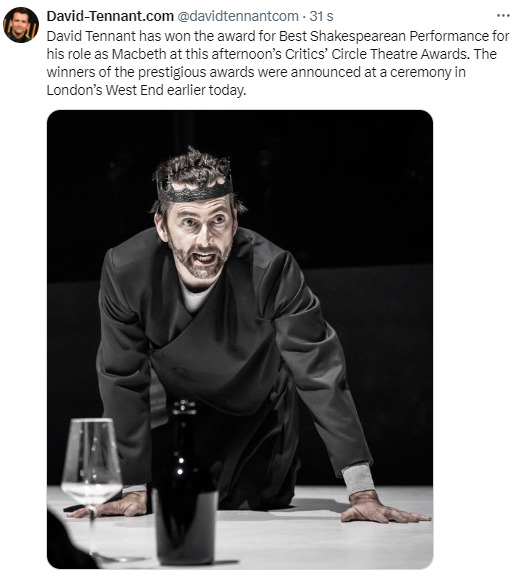
fuck yeah! :)
3K notes
·
View notes
Text
Renamed: The Performance Critic
To visit The Performance Critic, please click here or copy and post the following link into your browser:
www.leejamesbroadwood.com/tpc
The Theatre Reviewer, now called The Performance Critic, has a new home on my website.
For this reason, this specific site now serves only to redirect readers and will eventually be discontinued.
Review requests are still being accepted! To request a review…
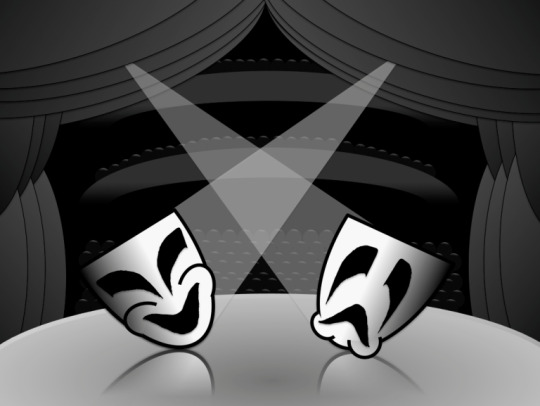
View On WordPress
1 note
·
View note
Text
seen a couple people running to that "is it bad writing or do you not understand genre" post in regards to the ofmd upset. and let me remind people that this show was marketed as a romantic comedy, ESPECIALLY this season!
In that regard, I found an article/blog post that directly addresses the question "can you have character death in a romantic comedy?" And it really hits the nail on the head.
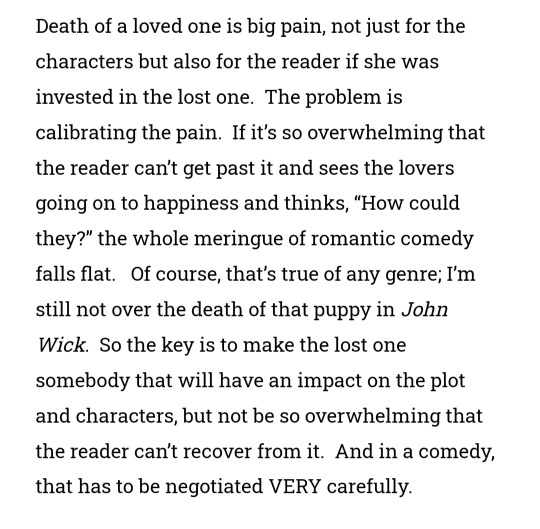
Even if you were to make the argument "well it's a dark comedy!" or "its a pirate show!" there's still a balance that needs to be met if you don't want to alienate your audience.
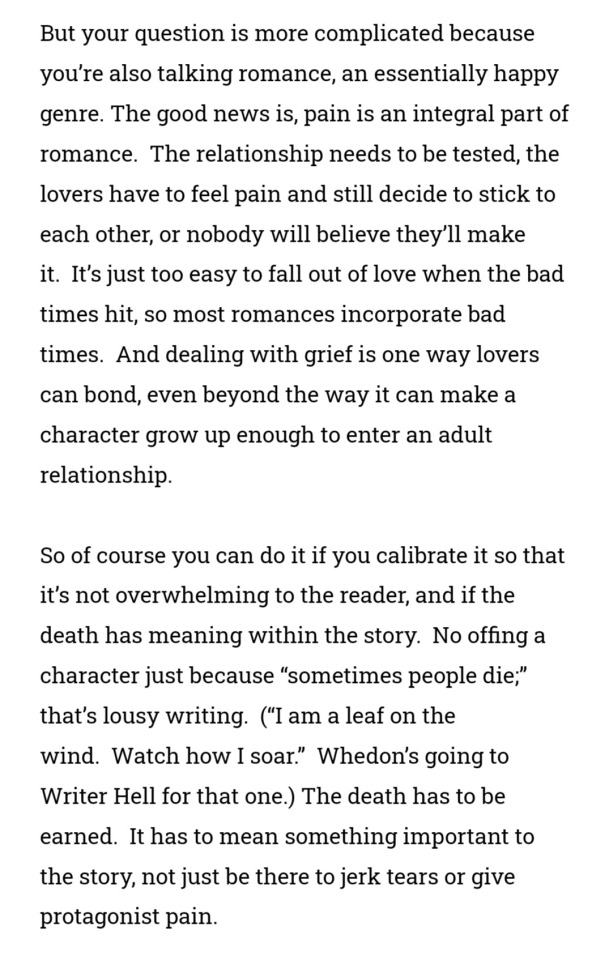
People are going to argue that the death was earned because they spent the entire season building up his character and "completing his arc". Well, I'll argue that they DIDN'T complete his arc. In fact they took about twelve steps back in his death scene by seemingly ret conning his progress and having him center Ed's feelings on his literal deathbed. So it really feels a lot like fridging, because that's exactly what it was. Izzy's death was for Ed's arc, not his own. And they spent so much time focusing on Izzy all season, focusing on his growth and giving him such a specific arc about queerness and recovery, that yeah, his death feels like a slap to the face and not a tragic story beat that makes the story all the richer.
#ofmd spoilers#ofmd season 2#ofmd#izzy hands#ofmd s2#thought about going into the definitions of comedy and tragedy in terms of classic theatre and shakespearean drama but modern story telling#has really diverged from those structures especially in television and with the way shows are produced#even so if i get fired up enough maybe i'll make another post about it#cause there are Rules to shakespearian comedy and even in modern storytelling those rules are generally respected#ofmd critical
451 notes
·
View notes
Text
Had my first play review published in a major national newspaper today. I'm over the moon!
#not trek#my life#theatre critic life#still striving for a tiny bit of anonymity here so not linking to it but you can ask#aaaaaaaaahhhhhhh my loves i'm so happy#i've published hundreds of reviews but this is the big time
165 notes
·
View notes
Text

#stray gods#laura bailey#critical role#dimension 20#ashley johnson#erika ishii#anjali bhimani#greek myth#greek mythology#music#musicals#musical theatre#greek gods#stray gods: the roleplaying musical#humble games#summerfall studios
453 notes
·
View notes
Text
ashley starting off so strong by saying “I’M GOING TO-” and then flipping through papers for ten seconds of absolute silence before saying “…hide” is exactly the kind of energy i would expect from a newsie seeing a ghost for the first time
#candela obscura#critical role#ashley johnson you’re so special to me#also the unfortunate theatre kid in me keeps looking at auggie and singing newsies :/#critical role spoilers#cr spoilers#candela obscura spoilers#ashley johnson
568 notes
·
View notes
Note
OMG can you draw various sketches of Andrew?
MINORS DNI || AGE IN BIO BYF || DO NOT REPOST
This took me 7 different attempts to do cause um uh um um um uh um help meeeeee help me helllppp help meeeeeeeeeeeee HELP ME HELP ME SAVE ME




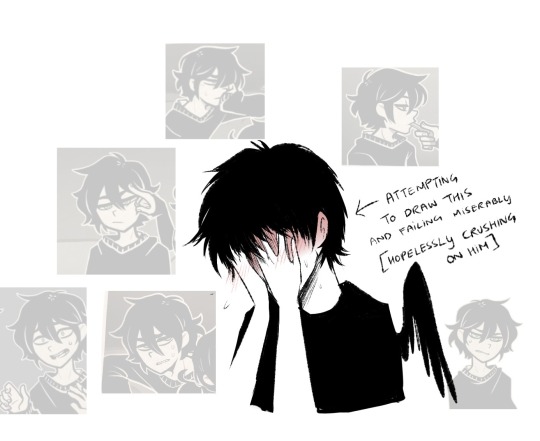
#i hate drawing characters I’m attracted to cause i get hyper critical when i draw them#but i also love drawing him#horrendous taste i know i know 7 page notes app apology coming soon to theatres near you#asks#anon#tcoaal#the coffin of andy and leyley fanart#the coffin of andy and leyley#the coffin of leyley and andy#tcoaal fanart#Andrew graves#Andy graves#silv draws
90 notes
·
View notes
Text
How long did Steve actually know Peggy?
(with pictures!)
[ post with just the images here ]
Short Answer:
626 days total / 20 months, 15 days, and only spoke on 8 separate days.
Long Answer:
Steve got his last 4F / first 1A on 14th of June, 1943.
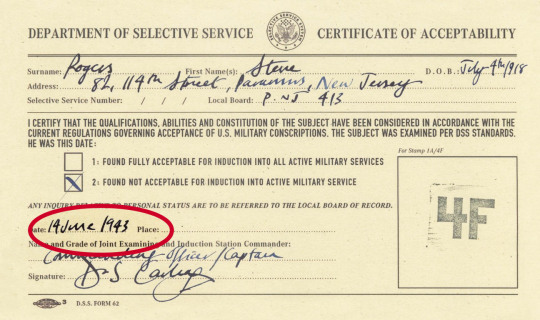
When Steve arrived at Camp Lehigh, Peggy introduced herself and the SSR.
Directly afterwards, Col. Phillips introduced himself and explained that they would be there for a week only before choosing someone to be given serum:
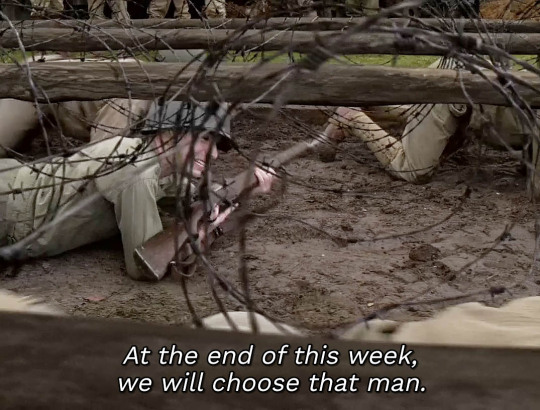
If they had any common sense, they would’ve said Steve was at Basic Training for a while before being drafted into Project Rebirth.
This being Marvel, however...
[ full 7K meta under cut ]
What If...?, Marvel’s Instagram, and Marvel Studios' The Marvel Cinematic Universe: An Official Timeline book gave the ‘official’ date of Steve’s serum as
June 22, 1943.
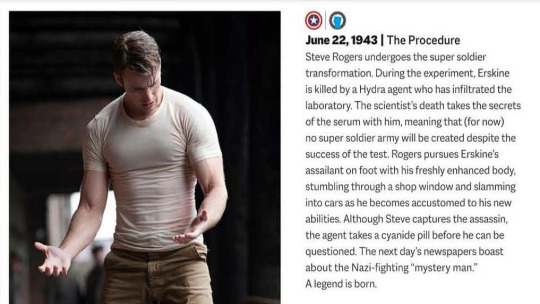

.
This means:
Steve was enlisted June 14th 1943,
shipped out to Camp Lehigh June 15th 1943,
was there for just a week (til June 21st 1943),
Had a conversation with Erskine about why he was chosen on evening of June 21st.
and was back in Brooklyn and receiving serum on June 22nd 1943.
Poor lad barely had any time to pack and unpack! 😲
Sidenote:
The first date shown in the movie is March 1942:

When Red Skull acquired the Tesseract.
This implies (but does not conclusively prove) that Dr Erskine must have been captured by the Allies before March 1942, because:
when he has his conversation with Steve, he merely said Red Skull believed “that there is a great power hidden in the earth, left here by the gods.” IE. he wasn’t aware that Red Skull had successfully seized that power (the Tesseract).
Stark is flummoxed by Tesseract-related tech when he sees it, which he surely wouldn’t be if Erskine had known about Red Skull having the Tesseract because Erskine could’ve just told him.
.
Anyway, back to the present and Steve was already in the local newspapers by Wednesday, 23rd June 1943:

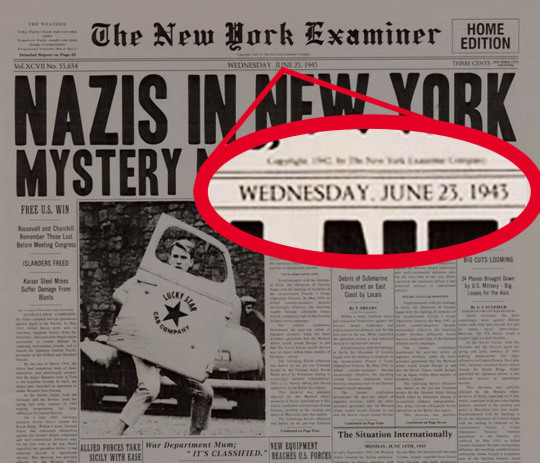
Anyway, he and Peggy only spoke for 1-2 days during that time: June 22nd, the day he received serum, and (what was probably) June 23rd, the day after.
.
IMO it seems like it’s just the day after because:

everyone who was at the blown-up Brooklyn base is there 👆 (wherever ‘there’ is) as if no time has passed at all...
...but we know that time must have passed, because Senator Brandt shows Steve a paper dated the 23rd [see above.] 👆 So enough time has passed for the newspapers to hear about Steve, for a journalist to write about it, print it, and for the Senator to get a hold of a copy.
Enough time has passed for the SSR to get the saboteur’s Hydra sub out of the water at the Brooklyn Navy Yard in order for Howard Stark to be flummoxed by it, as he is in this scene. (And he is still in the pit with it; he hasn’t had long enough to look at it already. Ergo, not much time has passed.)
You could say that it’s a later date, and Brandt just happens to have a newspaper from the 23rd. Except...
...Phillips mentions having talked to the president that morning... which makes more sense as something he would do immediately after the whole Hydra-saboteur bomb kerfuffle, not later. That’s not a phone call he could put off for days. That’s a call you make straight away.
Although that doesn’t automatically mean that that-morning’s phone call is the first or only phone call Phillips has made to the President, since the Hydra-saboteur-kerfuffle, meaning this could be a date later than June 23rd.
But the fact that:
everyone who was at the bomb site is still there,
Howard is still in the pit looking at the Hydra sub and admitting he’s clueless about it, as if that is new information he’s announcing,
they’re taking Steve’s blood, also not something to delay on,
and Brandt is asking basic questions about Hydra. If more than a day had passed, he would already know the answers to these questions, even if he had been distracted by the Press.
Suggesting it is very soon after.
The lack of delay in Phillips’s actions also supports this idea. Earlier on in the movie he moaned to Erskine about having had to talk to senators multiple times before he could get the ball rolling on Project Rebirth. But now he’s cheerful and decisive. Which to me suggests he’s had one decisive phone call with the President, where they exchanged all the information they needed, and that’s it. (He doesn’t say “I spoke to the President again this morning,” for example.)
Brandt asks Phillips what he’s going to do about Hydra. Phillips smirks and answers that the SSR is being re-tasked to go after them. As if he anticipated the question and got the President to sign off on that just prior; close enough to this moment that Phillips is only acting on those orders just now.
"This morning" implies that this scene is taking place later on in the day of June 23rd 1943; after the morning, so that Phillips isn’t saying he called the president just now, for example.
There’s strong sunlight coming in from the window behind Steve 👆, so I’d say we can place this scene at afternoon, June 23rd.
And we can infer that it isn’t evening yet, because Phillips refers to flying out “tonight,” as if if the night of June 23rd has not yet arrived.
.
(Another maddening possibility: it’s all happening on the same day, a day that Phillips just happened to have spoken to the President on the phone in the morning already, but either the prop makers got the date wrong on the newspaper or the official Marvel instagram got the date of Steve’s serum wrong. 🤦♀️)
.
So, timeline:
June 22nd, 1943: serum, bomb/saboteur, Erskine’s death.
(possibly but not definitively) June 23rd, 1943: morning, newspapers reporting on Steve are printed (Senator Brandt sees them), the Hydra sub is shipped to dry dock for Howard to look at, and the President tells Phillips via the phone that the SSR is being retasked “as of today.”
afternoon, Steve has his blood drawn, Phillips relays the President’s orders to him, Brandt, Peggy and Stark. Steve objects. Brandt recruits Steve for the USO.
night, Phillips, Peggy and Howard fly out.
.
Unless it’s all the same day, in which case the events go:
June 22nd or 23rd:
morning, Phillips talks to the President who officially re-tasks the SSR, Steve gets serum, blown up, Erskine killed.
afternoon, the Hydra sub put in dry dock for Howard to examine, newspapers rushed out an edition about Steve, Brandt recruited Steve for the USO using said paper.
night, Peggy, Phillips and Howard flew out to London.
.
So Peggy was flown out to London that night, being (probably but not conclusively) the night of either June 22nd or June 23rd, 1943.
.
And then Steve was on tour with the USO for 4 months (from July 1943).
Probably starting mid/late July / early August, to give them enough time to find 20+ chorus girls, create and fit costumes, build sets, book venues, choreograph and plan a show, and do some rehearsals... though apparently not enough for Steve to have learned his lines. 🤦♀️
During this period, as the USO shows grow ever more elaborate (up to 40 showgirls, bigger sets, a fake Hitler, a military band, and harley davidson motorcycles) Steve also films multiple propaganda reels, signs autographs, takes photos with the public (and Senator Brandt), appears in his own comics, sneaks into the cinema to watch himself on screen, and travels to Buffalo, Milwaukee, Philadelphia, Chicago, and New York! 😵
Senator Brandt’s smooth patter in recruiting Steve for the USO, how he acts during it, and the fact that there was a cameraman there to take photos of Steve just before he got serum, to me suggests that Brandt was planning to do this USO show with whoever the serum worked on.
So it’s possible a lot of the show logistics and planning were already underway before Steve was even chosen for serum. That would mean the USO show kicked off much sooner after Steve got serum (which might account for why he’s so nervous on stage...)
And it would explain how they were able to cram so much activity into four short months.

.
Meanwhile, in October 1943, in Azzano, Italy...
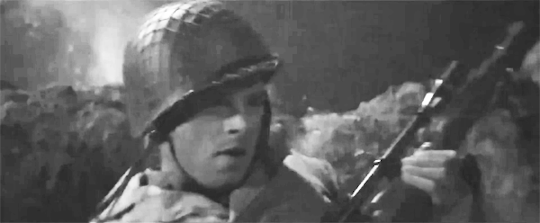
And then Steve goes to Italy, five miles from the front
on the 3rd of November, 1943:

We can see that Steve and Peggy were not in contact in between these times / while he was on USO Tour, because:
no reference to any such contact is ever shown or implied (and Kevin Feige said Steve was sleeping with someone else while on tour).
Steve looks surprised to see her when she shows up. He hasn’t invited her to come -- which he could, by letter -- and asks her what she’s doing there.
She’s cagey about why she’s there/what she’s been up to; so she’s not someone who even can carry on a correspondence, given the classified nature of her work.
If they had somehow been corresponding anyway, she would already have told Steve by now that she can’t talk about her being there/why. So he wouldn’t need to ask.
As well as Steve not knowing basic things about her, she also still doesn’t know basic things about Steve, that a casual correspondent of four months would know by now [see below].
.
We know the rescue of the 107 was on the night of November 3rd, 1943.
Because Phillips cites that date when he’s typing up Steve’s official KIA letter:
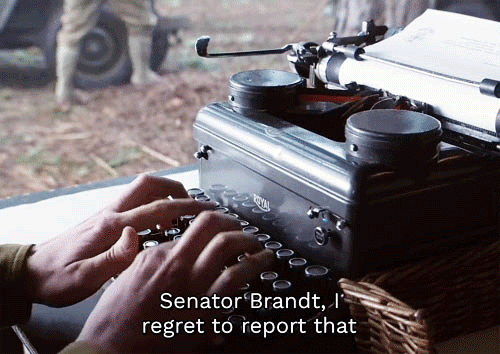
The sequence before Steve’s rescue of the 107 also implies that Bucky et al were only captured very recently at Azzano, because:
the rest of the 107 are still there (haven’t been deployed elsewhere),
wounded are still being brought in,
Col. Phillips is still engaged in writing up condolence letters about the lost soldiers when Steve barges into his tent.
(Why is the head of the SSR in Italy, writing condolence letters about the 107 when he specifically said he and his agents were flying out to London, where his HQ is?
Here’s a clue from wikipedia:
“Alsos personnel followed close behind the front lines in Italy, France, and Germany, occasionally crossing into enemy-held territory to secure valuable resources before they could be destroyed or scientists escape or fall into rival hands.”
However, those personnel would not include the head honcho (Phillips), the entire Army’s number one weapons contractor (Stark), or a desk jockey whose opinion is neither sought nor valued (Peggy).
And the rest of the movie shows them back in London (and therefore not featuring in field footage of the Commandos), while Steve & Co. destroy Hydra weapons factories (not sweep them for intell.)
And they stay in London, until the entire army hits a very important base at the very end of the movie. And even then, Stark isn’t shown attending!
So maybe he was just in Italy for the chorus girls...? 🤷♀️
.
Steve and the Howlies had to have to covered 35 miles as the crow flies (30 miles behind enemy lines + 5 miles to the Army base), with wounded soldiers, and through what Phillips describes as “some of the most heavily fortified territory in Europe” which was also mountainous. They would’ve had to seek a flat route to get the jeeps through. And this with no resources -- like food, medicine, specialised clothing, etc.
Covering 5 miles a day under those extremely difficult and dangerous circumstances, it takes them a week to get back to Camp.
(Sidenote, I looked up a modern estimate of hikers on the Swiss Alps, and it said they’d traverse a 105 mile trail over 7-10 days. Viz. potentially 10.5 miles a day!)
Making the day of Steve’s return 👆 at least, November 10th, 1943.
Marvel Studios' The Marvel Cinematic Universe: An Official Timeline confirms this:
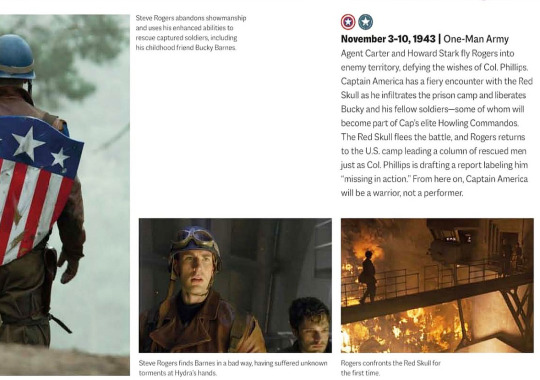
.
Afterwards, it seems they went straight to London.
(No contact with Peggy in transit is shown or implied).
.
Sidenote: although no other locations and no other interaction is shown in November, between the 107 returning and Steve being in London, it seems as if some time has passed.
And once again, we can tell that because of Senator Brandt and newspapers.

There has been enough time for more than one newspaper (The Daily Mail, and Stars and Stripes), to publish stories about Steve. 👆
For Senator Brandt to announce that he’ll be giving Steve a medal for valour, and for that news to have travelled back to the UK.
And, at the very least, enough time has elapsed since the 10th of November for the Senator to believe that Steve could feasibly travel back to America in time to receive his medal in person.
(Which he declines to do. LOLOL.)
So, say:
11th: newspapers report (Steve & Co travelling back to London).
12th: news reaches America / Brandt decides / announces the medal.
13th: Brandt expecting Steve to fly from Europe to America (which would’ve taken over 17 hours, then.)
Doesn’t necessarily have to be the very next day, but based on past behaviour Brandt expects action to be taken the very same day as the press reporting on Steve! So...
14th: for the actual medal ceremony? (so that Steve isn’t travelling for 17 hours and then immediately appearing in public)
Which seems like it’s happening simultaneously with Steve being in London; I don’t think he’d delay on relating his intell about Hydra.
(And that last day would also account for how the news has travelled back to the UK from the US in order to appear in The Daily Mail.)
We know that this day Steve is in London is supposed to be the day he’s receiving his medal, in person, because of this CATFA deleted scene:
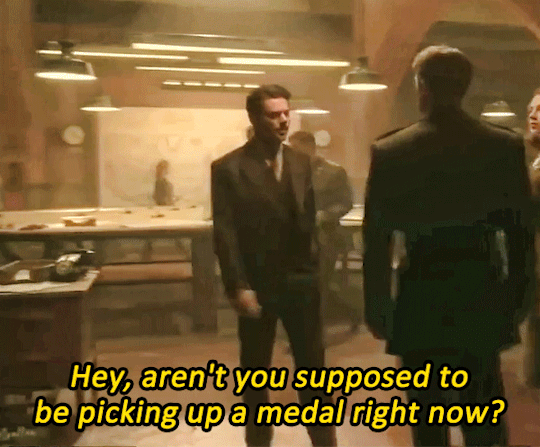
So IMO we’re looking at this date being 14th November, 1943 at a very strict minimum.
NB: All this pre-supposes that it takes 4 days to move the Howlies from the Continent back to London, which it feasibly might if they had Stark and his plane, still in Italy.
Stark’s deleted-scene surprise at seeing Steve in London suggests either he was not the pilot / his was not the plane responsible for flying Steve to London, or that he was / his was the plane but he expected Steve to move straight on back to the US.
We know the SSR had at least one plane in the US Army base in Italy, because someone was flying multiple reconnaissance flights, trying to spot the 107 -- the last of which returned Nov 10th.
.
In London, Steve and Peggy are shown talking on 2 separate days, total:
1) In the London HQ, relaying the intell about Hydra weapons-parts factories, gathered from the Krausberg weapons-parts factory and from Bucky, when Steve tells Phillips he has got his own team together.
And in the pub, on the evening of that same night, when Steve goes to Assemble the Howling Commandos for the first time.
(No time passing between these conversations is implied or stated, not via montage or any other means. It’s a straight cut. And assembling his team is not something Steve could delay on, after telling his CO he already had one. In fact it’s kinda nuts Steve didn’t think to do this before telling Phillips he had a team already. What would he have done if they’d just said no?? 😂)
2) in the London HQ, the morning of the day after (8am) when Peggy shoots at him.
(Won’t dignify either of those scenes with triggery screencaps!)
.
So Steve and the Howlies are officially a team from let’s say 14th November, 1943.
(We know there must’ve been a bit of a time delay before the Howlies were deployed, to give Stark time to build Steve the version of the Cap suit he requested -- since Bucky was the one who suggested him keeping it, I’ll bet Bucky had some input on that -- as well as supplying him with those Harley Davidsons WLA ‘Liberators.’
Could be the Howlies weren’t out on the Continent, kickin’ Nazi ass, ‘til December ‘43 or January '44.)
.
For the next 15.5 months there is no direct contact shown between Steve and Peggy, while Steve is on the continent and she is in London.

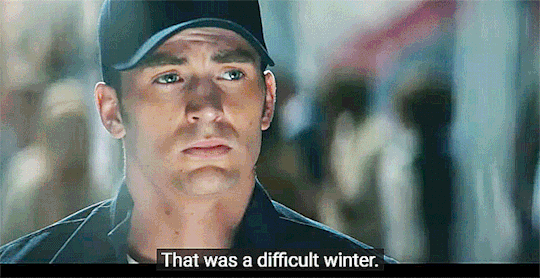
.
At first glance it looks like we can deduce roughly the dates of when Bucky died and Steve returned to London.
Because after capturing him Phillips tells Zola he sent a telegram about him*
*a prop which is not shown directly on screen
...on the morning of February 3rd, 1945:

Soon followed by a tight 24-hour turnaround for them to go and attack the Valkyrie base in Austria, which we know from this 👇 piece of dialogue between Col. Phillips and Gabe Jones:

But.
We don’t know:
1) that the date on the telegram is accurate.
This prop is not directly shown in the movie.
And, in the scene, Phillips hints at this telegram being intercepted by Hydra and this being bad news for Zola (because it says he is working for SSR. The Foreshadowing is INSANE).
So Phillips might have lied on that telegram -- back-dated it to make it look to Schmidt like Zola had betrayed him and been working for the SSR since before the Howlies ‘captured’ him.
Making the day of his interrogation... later than the Feb 3rd on the telegram.
2) that Zola Therefore told Phillips ‘you have 24 hours’ on February 3rd.
The telegram date could be false.
Even if it wasn’t, Zola could’ve said this to Phillips on a subsequent day.
He could’ve just told him when the date Red Skull was planning to do something was, and not necessarily 24 hours before that date.
Meaning we can’t tell by the telegram what date the HQ briefing about the Valkyrie mission, and therefore what date the Valkyrie mission (and Steve’s ‘death’) is, for certain. You could interpret it either way.
Steve might have ‘died’ on February 4th, 1945 or on some other date in February / early March, so long as it was 24 hours after Zola told Phillips he only had 24 hours to act, whenever that was. 😵
However, together, Agents of Shield 2.01: Shadows, and Marvel Studios' The Marvel Cinematic Universe: An Official Timeline tie in book, put Steve’s only possible death date as:
Thursday, the 1st of March, 1945.
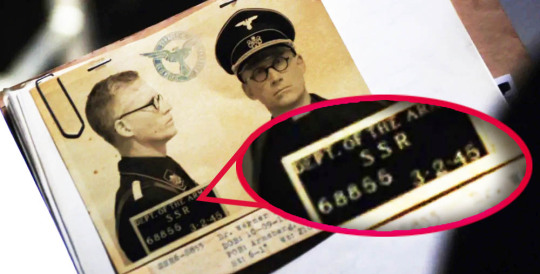

(Since Morita and Dum-dum capture Werner Reinhardt on 2nd of March, 1945, and Reinhardt remarks that Red Skull is dead. That leaves the 1st as physically the only date in March, before this point, that the Valkyrie mission could possibly have been.)
.
And we know (from CATWS canon) that Steve’s death was only reported (as a disappearance) on
Monday, 5th March, 1945:
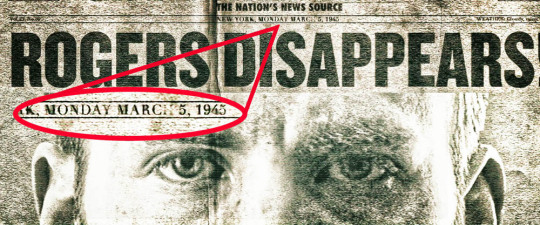
So I think we can definitively say that MCU intends for Steve to have ‘died’ on Thursday, 1st March, 1945. 😥
.
And the KGB opened a file on Bucky on Friday the 23rd of March, 1945.

.
It is not categorically stated that the mission where Bucky ‘died’ happened immediately before these late-February scenes in London.👆
He could, theoretically, have died in late 1944, as his exhibit in the Smithsonian in CATWS claims:
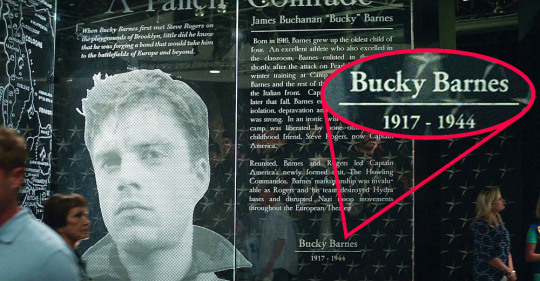
However, that exhibit makes multiple other errors...
(Such as: listing two different dates of birth on the same display, saying Bucky enlisted shortly after Pearl Harbour (when nothing in CATFA shows this), and his dog-tag number suggests he was instead drafted; saying he shipped out to Italy and was captured ‘that fall’ of 1942, when that year was definitely shown as 1943, and the Marvel Timeline tie-in book also shows Azzano as happening in October ‘43, etc.)
...So I think we can safely rule this out 👆 as a prop-maker’s mistake!
Plus, Steve’s grief in the pub feels very raw, very immediate, which to me suggest a very-recent bereavement, not something he’s had a couple weeks or months to weep over already. Steve’s a pretty stoic guy.
The only canon suggestion of time passing between Bucky’s ‘death’ and the pub scene is Steve having already had a chance to get back to London and write a report about it, in order to mention said report to Peggy and feasibly expect her to have read it.
As a soldier with a CO to answer to, that report is not something Steve could not delay on delivering. If Steve drinking in the pub is afternoon/evening, say this was the day he delivered his report (probably in the morning, this being the military).
That’s enough time to reasonably expect Peggy to have read the report, and for Steve to be drinking after delivering it, but still neatly groomed in his immaculate uniform, having just gone off-duty (not, eg. dressed down as if this is another, later day, a day off).
On the surface of it, it looks like we can’t say for certain that Steve’s drinking day is the day before Phillips interrogates Zola. Because it’s framed as if the stoicism he exhibits at the end of that sequence is the signal that he is now galvanised to act ASAP, ie. the very next day. One scene leading to / causing another.
Bucky’s ‘death’ date might have been any number of days before.
Except for one thing: Zola is a hugely valuable acquisition.
I don’t think Steve et al would’ve captured and brought Zola back to London, at extraordinary personal cost, only for Phillips to waste days before interrogating him. I think Phillips would’ve been in to interrogate Zola immediately.
That to me is the closest to ‘proof’ that Steve is back in London, delivering his report and then drinking in the pub, either on or as close to the day of Zola’s interrogation as physically possible.
(IMO this can’t all be happening on the same day.
I don’t think Steve is the kind of guy to deliver a report in the morning, go off and try to get shit-faced while still on duty / in uniform, and then go back to HQ for mission-briefing, with a risk of still being inebriated.
Not under normal circumstances, let alone when the mission is so important!
Steve appears to know already that he can’t get drunk... but that doesn’t stop him from trying.
I don’t think he’d do that if he knew he was expected back to plan the very-personally-important Bucky avenging mission on the same day.
CATFA writers may disagree and say this all happened on the same day, but that idea’s kinda wild to me!)
So when was that interrogation date?
I think we can deduce that it also must’ve been as-close-as-possible to the Valkyrie mission briefing date.
The fact that Gabe is asking how long they have means that that intell was fresh information to the Howlies on the HQ mission briefing date (which was 28th of February = 24 hours before 1st March.)
Now, if Phillips knew about 1st March being significant in advance of 28th February:
it would be incredibly stupid of him to not tell anyone until only 24 hours before.
he would’ve told the Howlies already / Gabe wouldn’t need to ask.
But if Zola only revealed the date of the Valkyrie Mission Day very close to the mission briefing date... that would explain why Phillips didn’t mention it sooner.
Another point: A lot of what Phillips says in the mission briefing sounds like a summary and continuation of what we see Zola telling him in the interrogation scene. As if there has been no further interrogation / no more intell to relate since that interrogation, a point in favour of it being the only time he has interrogated Zola (meaning it must be happening on 27th of February).
This scene comes before Steve is shown drinking, alone. (Implying Steve is drinking in the later pm, since it’s dinner time for Zola, just before.)
Assuming Phillips’ telegram about Zola is false (which is neater, and it being a lie is mentioned in the scene, and although we have the prop the prop is not directly shown on-screen in the movie).
Sunday, 25th February. Bucky probably 'died?’
Monday, 26th February. Howlies flying back to London, with Zola??
And since Phillips wouldn’t wait days to deal with Zola:
Tuesday, 27th of February.
Morning, Steve delivers his report.
Phillips reads the report, and sends a falsely-dated telegram about Zola to Washington via SHAEF HQ.
Evening, Phillips interrogates Zola, tells him about the telegram, and Zola tells him about 1st March / Valkyrie Day. (This is during ‘dinner’ time.)
Steve goes drinking, alone.
Wednesday, 28th February 1945, Valkyrie Mission briefing.
Thursday, 1st March 1945, Valkyrie Mission day.
NB: This pre-supposes that it only takes a day to move from the Continent back to London, which it would if they had a plane like Stark’s ready to pick them up any time -- which they well might, given how important it is to get Zola back to London, and get the Howlies out to take down the Valkyrie base.
If they didn’t have such a plane, of course, it would take them longer. However, nothing in the movie (such as, eg. a travel-montage) does show it taking longer. It seems to imply a very short timeline.
.
Sidenote:
Steve never does anything Peggy says or does, always does the exact opposite -- which is the moral, heroic, selfless thing -- and also never asks what she thinks he should do.
This is partly a symptom of poor / misogynist writing, whereby Token ‘Strong Female Character’ Love Interest is relegated to a Sexy Lamp with post-it note stuck to it + behaving like a generic male bully in a female skin + idiot hetero-norms that make any straight couple automatic foils, who must bicker miserably and be on the opposite sides of every argument in order to generate ‘Chemistry.’ 🙄
Ergo, Steve never does what Peggy says, because as his foil what she says it always the opposite of what he says.
Making it, defacto, the [unethical, cowardly, self-serving, tactically unsound] thing to Steve’s [moral, heroic, selfless, also tactically correct] thing.
.
(disclaimer: any other aspects of Peggy being unpleasant must be put down to Atwell’s performance choices.)
.
Her show erroneously claims that Steve relied heavily upon her for “courage, strategy, and moral guidance."
Passing over the outrageous, insulting, and demonstrably-untrue suggestion that Steve needed external courage, or ethical guidance, from a moral roomba...
(Metas on why this is untrue, and would actually make the plot impossible if it were true!
HERE, HERE, and HERE .👈)
...This would mean Steve is -- somehow -- relying upon a person whom he doesn’t even speak to for 467 of the 473 days when strategic input was even relevant to his life. 🤦♀️
The numbers don’t lie.
Steve cannot have been relying upon Peggy for anything when they weren’t even in contact. That’s not physically possible. 🤷♀️
This simultaneously puts the lie to the idea of Peggy following the Howlies around Europe to collate intell in the places they hit.
A) because the Howlies aren’t shown sweeping these factories for information. They’re shown reducing them to fiery rubble, which you don’t do if you’re looking for documents.
They’re not looking for documents; they’re looking for Zola.
B) even if the Howlies weren’t destroying the factories and were sweeping them for ABC (atomic, biological, chemical) intell, Peggy isn’t the kind of specialist who would even know what to look for.
She’s an intelligence liaison, not a scientist.
Not even a linguist.
That’s not her area of expertise at all.
Whereas the Howlies themselves are... surprisingly well qualified?
They’ve worked in a Hydra weapons factory, so they know what’s important. Monty’s a Major. Gabe is a fluent German-speaker. Frenchie handles explosives. Dum-dum can drive tanks. Morita looks like a radio expert; shown operating captured Hydra radios more than once. Bucky’s a sniper. Steve’s a tank with a perfect photographic memory.
They really don’t need an eighth wheel telling them how to blow up Hydra factories (how would she know?) That’s already their forte.
C) even if Peggy was a technical expert, her opinion is repeatedly denigrated by Phillips who says she was a chancey (ie. ill-qualified) hire. He wouldn’t send someone to judge important documents who is ill-qualified to do so and whose opinion therefore doesn’t carry any weight with him.
D) The only time she’s shown taking part in a mission, it’s actually more of a full blown Army Operation, where even the old man Phillips goes along in person.
This is an unusual occurrence, i.e. not something she normally does.
Just like I can’t claim that Col. Phillips fought alongside the Howlies, in person, throughout the war, because that is not what is shown, I cannot claim that Peggy did, either. Because that is also not what is shown.
(And also why she didn’t join Steve on the mission to rescue the 107. That’s just not her job!)
So when Peggy asks Steve if he was about to... (do something important) mid-Valkyrie mission, and he goes ‘right!’ and carries on.
That’s the closest Steve ever comes to agreeing with her or doing what she says. (Another nonsense claim from her show.)
It’s OOC for Steve, who has proven mostly indifferent to her increasingly unsubtle advances thus far (until she turned violent, whereupon he (or someone else) put her photo in his compass... which is just sad, tbh. 😥)
Whereas, her interrupting the mission at a crucial point to make it about herself (to make Steve kiss her the same way Lorraine also sexually assaulted him) is consistent with her characterisation elsewhere in CATFA
(eg. interrupting Steve’s 107 rescue to make him include her in it, when she was irrelevant.)
Even then, it’s something Steve was going to do anyway, regardless of whether she told him to or not. So her input is not a deciding factor in the plot (still a Sexy Lamp). Her net moral/strategic impact on Steve is still zero.
(Another point in the ‘they didn’t spend any time together’ column.)
.
Conclusion...
Steve and Peggy knew OF each other for 626 days
or 20 months, 15 days / 20.5 months.
(From mid-June 1943 to the beginning of March, 1945.)
They spoke on 2 days max in June, 1943 (the 22nd and probably 23rd, the day of his serum and day after) despite being in the same place for a week prior and sharing a prior car ride!
They spoke on 4 days in November 1943.
Nov 3rd, in Italy, pre-107 rescue,
Nov 10th, in Italy, post-107 rescue,
Nov 14th(?) In London, the day Steve relayed Hydra intell and told Col. Phillips he was assembling his own team, while Brandt was expecting him to be in America receiving his medal for valour; probably the same day the Howlies were founded.
Nov 15th(?) 8am, in London, when Peggy shot him.
They spoke on 2 days in February & March, 1945:
in the pub in London (Tuesday, 27th February?)
the day of the Valkyrie raid (Thursday, 1st March.)
(While they are shown in the same place on another intervening day, at London HQ during mission planning, and it’s possible or even plausible that they did interact, they’re not actually shown speaking to each other on that day.)
Totalling: a maximum of 8 days.
(could be as low as 6.)
.
And 6 months later, Peggy, Stark and Phillips founded SHIELD and had already recruited Zola into it in order for it to be front page news by
Tuesday, 14th August, 1945:
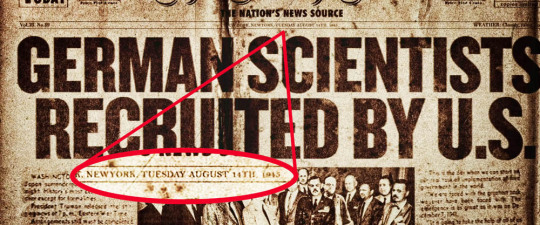
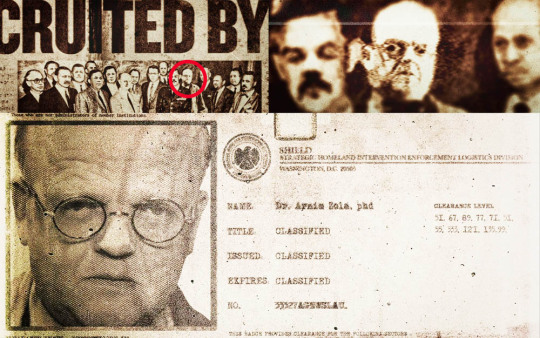

(Thus putting the lie to the ridiculous idea that they didn’t know they’d recruited Nazis or what they were up to, btw. 👆)
.
So of the 20.5 total months they knew each other, Steve and Peggy were only shown being in the same place and in contact during (but not for the entirety of) 4 months -- Jun and Nov ‘43, and Feb and March ‘45.
For 19.5 of the 20.5 months they knew of each other they were not even in the same place:
4 months while Steve was on one side of the Atlantic, during the late June-October USO Tour, she was in Europe.
And 15.5 months / 473 days when he was on the continent doing Hydra weapons-parts factory raids (from mid-Nov 1943 - Mar 1945) and she was in London.
And this is deliberate by the film-makers, to depict theirs as a thwarted relationship-that-never-was, a Casablanca style ‘we never dated’ situation.
Not a romance, but what could’ve been a romance, had circumstances been different.
Them not being together is literally the point.
.
They show zero direct or indirect contact between the two during those 15.5 months, and multiple things imply that there was none.
For example:
She doesn’t know that Steve has a friend in the 107 (a correspondent would).
Steve is surprised to see her.
Steve tells her about what he’s been up to, as if it’ll be new information to her.
(Sidenote: as per She Hulk, Bruce Banner is under the impression Steve slept with some woman during this time. SIGH.)
Despite Agent Carter show’s attempts to retcon her history (stolen valour) with Bucky’s war record (nonsensically, since he is a soldier and she’s supposed to be a spy), the film and script are clear that she isn’t in Europe with the Howlies.
(She complains about having every door shut in her face, professionally, and Phillips says she was only at a desk job because he “took a chance with” hiring her. So she’s complaining about not being in the field.)
Steve wouldn’t be carrying a photo of someone he sees for work all the time. The compass is physical evidence that she wasn’t there.
(Sidenote: He wouldn’t be dating anyone Period, since he specifically said he didn’t want to do that.
And Peggy also said she wouldn’t date until after the war is over. But anyway!
And, logically, if she's supposed to be a spy she also wouldn’t have her face broadcast in cinemas, making any cover useless, as Steve would know. But anyway!
It just highlights how they’re not really doing their jobs of writing her as a spy properly.)
Steve wouldn’t need to take a photo out of an SSR personnel file (which is what it looks like) if he saw her regularly in person for work or if they had been corresponding by letter.
(This simultaneously rules out the possibility that she went out with the Howlies and then went back to London.)
Likewise, Peggy wouldn’t need to steal a photo of Steve out of a personnel file if they had been in regular contact, either in person or by letter.
Steve and the Howlies are shown in direct contact with each other, easily implying a long-standing relationship without having to go to a lot of film-making effort, via montage... but she is not.
Whereas she is shown in the montage, but not being in direct contact. If the film-makers had wanted to show direct contact between them during this montage, they very easily could have. But they didn’t. If she had been there with the Howlies, and it was the film-makers intention to imply that, she would be in the footage with the Howlies, not sitting in a cinema in London watching footage of a mere photo of herself in the newsreels.
By February 1945 she still isn’t on first-name terms with Bucky, Steve’s second in command.
Steve’s time in London was so minimal that when he goes drinking to grieve Bucky, Peggy is able to find him in the Whip & Fiddle, even though it’s in ruins. So either they were in London for such a short period that the pool of places he could potentially be is only one (1), AND/OR that pub is emotionally significant because of Bucky, the person he’s grieving (not her).
We are never shown the Howlies returning to that pub at all until after Steve is also ‘dead’ (ie. no proof they’ve been in London long enough that it’s a place they’ve gone multiple times.) They treat it as a special, 'one-off Solemn Event’ sort of a place to go. Not a regular haunt.
And Steve is still surprised to see her there, meaning he didn’t tell her he was going there; so the reason she finds him can’t be because Steve told her where he was going. (Could be that one of the Howlies told her.)
She still has to ask Steve whether he respected “your friend” Bucky (when even Col. Phillips knows to refer to Bucky as Steve’s oldest friend, by this point).
Steve tells her he can’t get drunk and has to ask whether she knows that already or not. Yet another example of something a close confidante or correspondent of 15+ months would know, that Steve would assume she already knew, if they had been in continuing contact.
(It’s unlikely that Steve himself didn’t know, before this moment.
Soldiers who founded their unit in a pub haven’t done any drinking for 15.5 months? Not likely!)
His clever acting choice lends an air of despair and futility to the scene, too -- Steve trying to drink away his sorrows, even though he knows it won’t work. He can’t undo the past, he can’t bring Bucky back.
(Had CEvans’s tone been different, it would’ve connoted something else.)
If he was in contact with Peggy, and this is canonically the very kind of thing he would complain about to her (and canonically also the very kind of thing she would tell him more about), then he would’ve complained about it, eg. via letter, too.
But he didn’t, because he doesn’t know whether or not she knows. So they weren’t in contact.
.
It is shown that the updated intelligence of what Steve and the Howlies are accomplishing in Europe during 1944 is being relayed back to HQ in London, because Peggy and other personnel are shown taking Hydra base flags off their maps, as Steve and the Howlies take them out.
(As a consequence of Steve et al taking them out, it’s implied.)
However... it is not shown that Steve directly relayed that information to Peggy.
Peggy herself says that Phillips is in charge of devising strategy, not herself, and Steve soon disregards any strategy suggestions she makes -- in fact, he gives her orders, not the other way around, because he’s a captain.
So if Steve was telling anyone what the Howlies are up to in Europe, it would be his superior officer Phillips. Not an agent like Peggy, of no military rank.
(This is supported by the scene where Steve, having returned from rescuing the 107, goes straight to Phillips to report his successful mission. Not to Peggy, despite her being right there.)
Plus, the Howlie shown handling communications isn’t Steve...
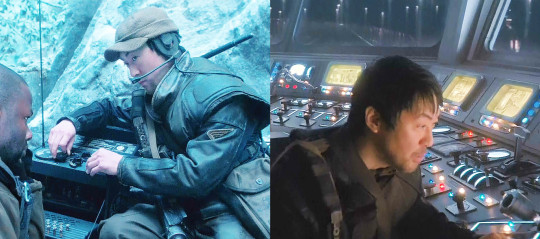
...it’s Morita. 👆 (And guess who interrupts and shoves him out of his seat?)
So if the Howlies were in contact at all during the 15.5 months of Howling Commando Hydra weapons-factory raids:
1) it would’ve been very difficult / limited, and all shop talk.
2) it must’ve so unimportant that no trace of it shows in the film.
3) it probably wouldn’t have been Steve on the radio, anyway.
4) there were only six prospective Hydra weapons factories mentioned as targets for Steve and the Howlies, so only six more occasions when they even might’ve officially interacted:

Roughly:

And while there are more Hydra bases indicated as existing on the maps/via flags removed from the maps...
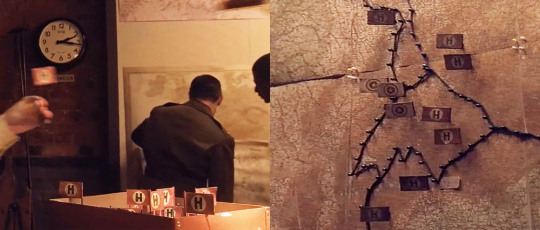
...None of these 👆 are explicitly linked to Steve and the Howlies, there’s no indication that the existence of these was discovered or relayed (or that they specifically were destroyed) by Steve and Co.
And it’s made out to be a Big Deal that they find out where the Seventh base is, (the base Bucky told Steve they were shipping weapons parts to). Because that’s where Red Skull is.
.
T I M E L I N E :
1943
JUNE:
Mon 14th, Bucky gets his orders, Steve gets a 4F, visits the Stark Expo, meets Erskine, enlists and gets a 1A.
Tues 15th, Bucky ships out, Steve arrives at Camp Lehigh.
Mon 21st, Steve is chosen for serum. He and Erskine discuss it in the evening.
Tues 22nd, Steve receives serum, Erskine is killed, Steve stops the Hydra saboteur, and is photographed by a NYE journalist.
Wed 23rd
morning, Phillips speaks to the President and the SSR is immediately re-tasked, Steve appears on the front page of The New York Examiner, the Hydra sub is moved to dry dock.
afternoon, Steve has his blood drawn, Stark examines the Hydra sub, Phillips relays the President’s orders, Brandt recruits Steve into the USO when he objects to Phillips's orders.
night, Phillips, Stark, and Peggy, fly out to London.
.
JULY-OCT: Steve in the USO, travelling across America.
OCT/NOV: Bucky and the Howlies are captured by Hydra at Azzano.
.
NOVEMBER:
3rd,
afternoon, Steve does USO show in Italy, 5 miles behind enemy lines.
evening, Steve rescues 107.
10th, Steve returns to base with 400 soldiers of the 107, having safely travelled 35 miles including 30 miles of mountainous heavily fortified enemy terrain, with wounded in tow.
? 11th-14th, Steve's rescue is reported in Stars and Stripes, Senator Brandt decides to give him a medal for valour, news gets back to UK and appears in The Daily Mail. Brandt expects Steve to come back to the US to receive his medal in person. Steve declines.
? 14th, London, HQ, Steve relays Hydra intell to Phillips and Peggy,
night, Steve recruits Bucky & the Howlies, takes Bucky's input on the suit.
? 15th, London, HQ,
8am, Steve gets sexually assaulted, Steve gets physically assaulted (Peggy shoots at him), Steve picks the shield, Steve relays Cap uniform ideas to Stark.
.
1944
Howlies deployed in Europe, taking out 6 Hydra weapons factories shown in Italy, Greece, France, Czech Rep. and Poland.
(Avengers 1 deleted scene also shows Steve taking part in the planning of D-Day, which would’ve put him and the Howlies in France from 6 June 1944 - August, if they took part. And I thought there was a reference to Steve taking part in the Battle of the Bulge too, somewhere, so that would be Dec-Jan ‘44-45.)
.
1945
FEBRUARY:
(possible) Sun 25th, Bucky ‘KIA.’
(possible) Mon 26th, Howlies & Zola travelling back to London.
(possible) Tues 27th, London
am, Steve writes/delivers a report about Bucky, goes drinking to grieve.
Phillips (reads Steve’s report? knows about Bucky) sends a misleading telegram about Zola, back-dated February 3rd, to Washington via SHAEF.
pm, Phillips interrogates Zola and finds out 1st March is Valkyrie Day.
Wed 28th, London, HQ, Valkyrie Mission briefing.
MARCH:
Thurs 1st, Atlantic. Steve and Red Skull 'KIA.' Last contact with Peggy.
Fri 2nd, Moria and Dum-dum capture Werner Reinhardt.
Mon 5th, Steve reported "disappeared" in newspaper.
Fri 23rd, KGB opens file on Bucky.
APRIL:
Surviving Howlies are mopping up remaining Hydra personnel in Europe?
MAY.
Tues 8th, V-E Day. London. The Howlies reunite at the Whip & Fiddle, for the first time since they were founded there, to drink a toast in remembrance of Steve.
AUGUST:
Tues 14th, Stark, Phillips and Carter have founded SHIELD and recruited Zola and more, which is reported on front page news.
.
TL;DR: They knew of each other for 626 days total,
(from 15th June 1943 - 1st March 1945),
20.5 months; 19.5 of which they weren’t in the same place,
and only spoke on 8 separate days.

#timeline#historically accurate stucky tag#long post#antipeggy#antisteggy#steve rogers#p*ggy meta#steve meta#mcu critical#shieldra founders#steggy is hydra trash party#catfa#catfa meta#meta#mcu meta#cynthia glass#antiendgame#endgame steve is a skrull#mcu#dat's me#this meta is:#7K#CATFA timeline spans: 14th June 1943 -- 1st March 1945#someone was picking my brain about this so I thought I'd put all the meta thoughts I had in one place to address the question 👆#steve was only in the european theatre of war for 1 year 3 months and 27 days (or 15 months and 27 days) 😥#funfact:#if steve only knew bucky from 6th of january 1928 (while still aged 9)#then he would've known bucky literally 10 times longer than he knew her 🤷♀️#(not including the present-day)#my meta
82 notes
·
View notes
Text
*lacing up my big shoes before tonight’s episode*
*painting my face in Mehron brand cake tin makeup in the color clown white*
*putting on the traditional costume of a harlequin in comedia del arte*
*wearing a bowler hat in the style of a tramp or hobo clown*
*being laughed off the stage for combing different types of clown from various points in history instead of sticking to one cohesive style*
I’m keeping my eyes peeled for ashrym crumbs
#critical role#orym of the air ashari#ashton greymoore#ashrym#I really exposed my theatre arts degree with this post
84 notes
·
View notes
Text
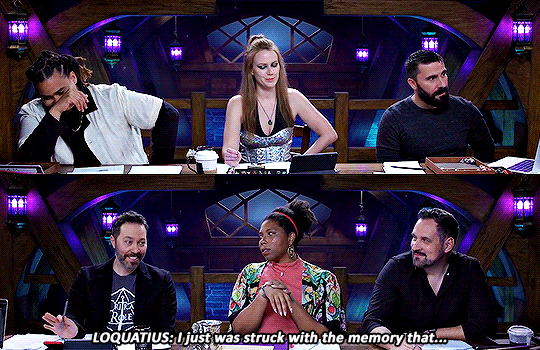
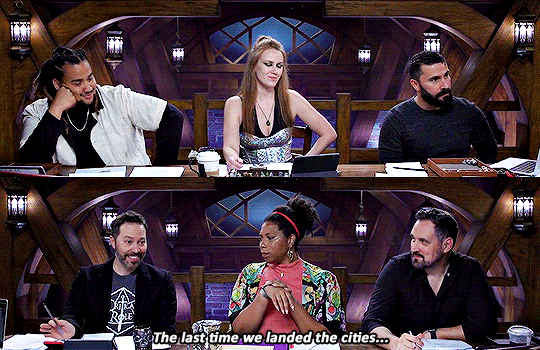
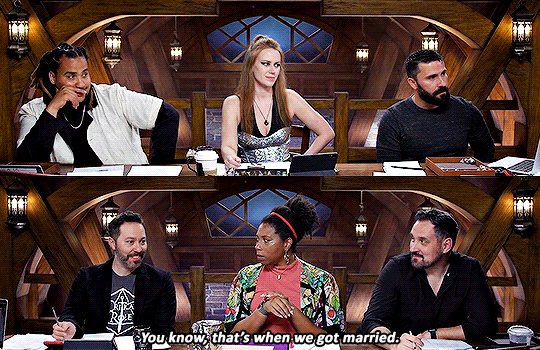
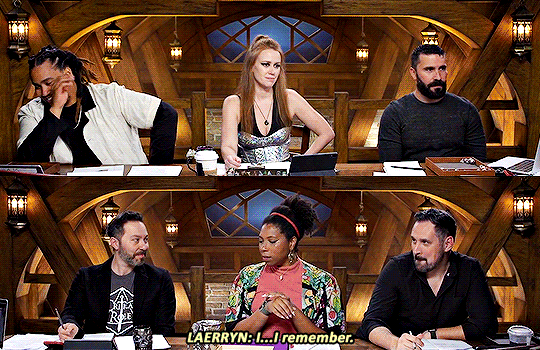
ExU3E1: the lights shining gold as loquatius and laerryn recall their wedding
(requested by @starsigna)
#critical role#criticalroleedit#exu#exandria unlimited#exu calamity#exu: calamity#loquatius seelie#laerryn coramar-seelie#gifs#*#*cr#*request#r: laerryn x loquatius#marisha ray#producer ray#theatre#scheduled#1h7m exu3e1#BREAKING NEWS IS CRITICAL ROLE SCRIPTED??? [NOT CLICKBAIT]#this is STUNNING. i hope these gifs do it justice it's kind of hard when you have to break it up into multiple images#thank you for the request and for giving me so much time to make this dkfjskdfjsd#I LOVE LIGHTING DESIGN. THE WAY THEY JUST HHHHNGH LIGHT THINGS
593 notes
·
View notes
Text
"Minkowski's been talking about Sondheim again…": Minkowski's love of musical theatre and what it reveals about her characterisation and her relationships
TL;DR: Renée Minkowski's love of musicals, while it might seem just like a mundane character detail, is used to give depth to her character because it contrasts with expectations of her from both the listening audience and the other characters. Her willingness or unwillingness to share this interest in different circumstances reveals her relationships with other characters at various points.
Since this is a long one, if you'd rather read it as a document, you can view it here: Google Doc version.
"She actually really cares about these talent shows": Episode 8 (Box 953)
In the early episodes of Season 1, Minkowski is presented (largely through Eiffel's unreliable perspective) purely as a strict no-nonsense authority figure without much emotional depth, the kind of person who only likes things that are useful, purposeful, or mandated by Command. In contrast, musical theatre is a creative pursuit that has nothing to do with the mission of the Hephaestus and is viewed by many people as fairly frivolous or silly. The gradual exploration of Minkowski's passion for musicals is one of the many ways that the show expands and challenges our understanding of her as a character.
The first indication that we get of her interest in musicals is through her entry into the infamous talent show, something that is required as part of the mission. Minkowski really cares about 'crew morale' activities in general, even when they actually have a negative effect on morale and even before she's friends with any of her crew (for example, the Christmas and Thanksgiving dinners in the earlier stage of the mission), perhaps partly because doing things in the "right way" is important to her.
But Eiffel senses that the talent shows aren't just about rules for her: "it’s bad enough when she makes us do something just because it’s military protocol, but I think that she actually really cares about these talent shows". This might be the first indication that we get of Minkowski caring deeply about anything that isn't inherently part of her role as a Commander. Moments like this are part of the gradual process of giving us insight into her character beyond the Commander archetype that she tries to embody. And yet, she only indulges her theatrical passion because something mandatory gives her permission, or an excuse, to let another part of herself out.
Of course, to satisfy the needs of a talent show, she'd only need to provide a performance of a few minutes. But Eiffel mentions "the second act of the play" - which along with Hera's comment that "Isabel isn't the biggest role in the play" - implies that Minkowski was intending to put on the whole of Pirates of Penzance as her talent show act, rather than a few of the songs or some kind of medley. (I suppose that Eiffel could be exaggerating or Minkowski might have been planning to do extracts from different parts of the play, but I prefer the interpretation in which Minkowski gets to be more ridiculous.)
Even though no one else would be willing to be in her production of Pirates of Penzance, Minkowski casts Hera as Isabel, a role with two lines and no solo singing. I found some audition notes for this play which said "The traditional staging gives [Isabel] more prominence than the solo opportunities of the part suggest, so she must be a good actress" which does make me sad in relation to Hera's inability to have a more significant role by being physically present on stage.
It’s sweet that Hera still wants to take part though. She tells Eiffel "Pirates of Penzance is a classic of 19th century comic opera", so either she’s absorbed what Minkowski has told her about the show, or she’s done her own research and formed her own opinions. I enjoy the fact that Hera is the one Hephaestus crew member who shows potential to share Minkowski's musical theatre appreciation; I like to think that this is something they could explore together post-canon.
Anyway, I'm obsessed with the idea that Minkowski was planning to play every character except one in Pirates of Penzance, a show which is designed to have 10 principal characters and a chorus of 14 men. It seems that her contribution to the talent show was supposed to be an entire two-hour two-act musical, with costumes and props, in which she would play almost all of the parts. This is very funny to me as the perhaps predictable consequence of giving an ambitious and frustrated grown-up theatre kid a position of authority and asking them to arrange a talent show. Minkowski knows that the audience will be made up of her subordinates who are theoretically obliged by the chain of command to watch and listen, so she absolutely tries to make the most of that opportunity. There's probably also a degree to which she limits other people's involvement in her musical because - as with her other endeavors - she wants the outcome to be almost entirely within her control (something that is usually pretty much impossible in as collaborative a medium as musical theatre).
Of course, Minkowski's behaviour in most of the talent show episode is affected by her being drugged by Hilbert. This creates an exaggerated situation which is the first real opportunity for Minkowski to be something other than the strict sensible authoritarian Commander and the foil to Eiffel's jokey laid-back attitude. I don't agree with ideas that being intoxicated brings out anyone's true self (especially in the absence of consent for the intoxication), but it seems pretty clear that being under the influence of whatever was in Hilbert's concoction caused Minkowski to fully commit to a level of manic enthusiasm for her musical production that might have otherwise been obscured by her professionalism. It's a particular kind of person who belts showtunes when drunk, and Minkowski is that kind of person, even if that's not how she wants to present herself. (As a sidenote, I seem to remember that they took Emma Sherr-Ziarko's script off her to help her sound more drunk. It's an excellent performance.)
Minkowski wants interval ice cream. She wants "pirate costumes" (and she'll threaten to shoot a man to get them). She wants "swashes and buckles". She wants whatever props she can get her hands on (including a real cannon). This show is important to her, even though only three other people will witness it and two of them actively don't want to be there. It’s important to her for its own sake.
Eiffel says Minkowski wants "a second pair of eyes to tell her if the prop sabre for her Major-General costume was a bit much…" While I certainly wouldn't put it past Goddard Futuristics to have a prop sabre on the station for no apparent reason, it feels more likely that she might have made it or adapted some existing item. Which suggests that maybe she was that passionate about the props even before Hilbert drugged her.
Even so, it does feel significant that Minkowski's love of musicals is only revealed in the episode in which she is drugged, exhibiting lowered inhibitions, exaggerated behaviour, and an "impaired euphoric effect". Her love of musical theatre is initially revealed through a professional structure that provides permission, and then further emphasised by a forced intoxication that exaggerates some impulses that perhaps she already had.
"Some hobbies other than making trains run on time": Episode 17 (Bach to the Future)
After Eiffel tells to find Minkowski to find something else to do while her work duties have quietened down, they have the following exchange:
EIFFEL: You must have some hobbies other than making trains run on time. Something to do with friends? Boyfriends?
MINKOWSKI: Of course I do, but, well, there aren't really a lot of opportunities for rock climbing or trail hiking in the immediate vicinity.
Even though this quote doesn't mention musicals, I've included it here for two reasons. Firstly, it's very funny to me that, even after the talent show debacle, Eiffel acts like he's never had any evidence of Minkowski's hobbies. She tried to perform a whole play almost single-handedly and it didn't occur to him that this might indicate an interest of hers outside of work. I think this reflects the fairly two-dimensional view that Eiffel has previously had of Minkowski, which her interest in musical theatre didn't fit into.
Secondly, it feels notable that Minkowski doesn't mention musical theatre here. She wants to show that she has non-work interests, but without undermining her own authoritative image. Her interest in rock climbing and trail hiking - while it may be genuine - fits with how she wants to be seen as a Commander. These are hobbies which portray her as physically capable, with a high degree of stamina and a willingness to adapt to perhaps less hospitable surroundings. Of course, Minkowski does have these traits and they serve her well on the Hephaestus. But there's not really anything particularly surprising about her expressing these interests. The surprise in this scene comes from the reveal that she has a husband, a character detail which - like her love of musicals - isn't something we'd necessarily expect from the archetype-based view of her we are initially presented with.
Her interest in rock climbing and trail hiking never come up again, because these details don't really deepen her characterisation (or at least, they aren't really used to deepen her characterisation beyond proving that she isn't entirely all-work-and-no-play). In contrast, Minkowski's love of musicals is brought up over and over because it shows another side of her that she struggles to reveal on the Hephaestus, and that allows more interesting things to be done with her characterisation.
"You wanted to write showtunes": Episode 35 (Need to Know)
Alongside the more high stakes discoveries prompted by the leak from Kepler's files, we also learn that Minkowski applied to - and was rejected from - the Tisch Graduate Musical Theater Writing Program.
Up until this point, we've only had evidence that Minkowski enjoys performing in musicals. But here we learn that Minkowski doesn't just love watching or performing in musicals - she wanted to write them too. This suggests a creative side to her that we never see her fully express.
The course
The Tisch Graduate Musical Theatre Writing Program claims to be the only course of its kind in the world and it accepts just 30 students each year. The current application process requires applicants to: upload play scripts or recordings of songs they've written; answer a large number of extended response questions about their creative process and views on musical theatre; write a 'statement of purpose' which has to talk about why they are applying and include 3 original ideas for musicals; provide a professional resume and a digital portfolio; complete an exercise of writing in response to a prompt; and undergo an interview. The process might have changed somewhat since Minkowski would have been applying (which, if it was soon after she finished college, might have been around the early 2000s) or it might be different in Wolf 359's alternate universe, but I think we can safely assume that applying to this course was a serious undertaking that required an intense amount of commitment and work.
Applying to a course like that isn't something you do half-heartedly or on a whim. You couldn't apply to this course if you hadn't done a fair amount of musical theatre writing already. (The course requires applicants to choose to apply as bookwriters, lyricists, or composers, but I'm not going to make a guess here as to which of these Minkowski went for.) The fact that Minkowski wanted to study this course suggests that she was seriously considering trying to make a career out of musical theatre writing. In Once In A Lifetime, she tells Cutter that commanding a space station has always been her dream job, but we've got evidence here that it wasn't her only dream job. There's something kind of funny and kind of sad about the idea that writing musicals was her back-up / fall-back career path. She does not like to make life easy for herself.
The revelation
This information is revealed against Minkowski's will. It's not something she wanted people to find out, and she isn't happy about them knowing:
JACOBI: "Dear Renée, thank you for your interest in the Tisch Graduate Musical Theater Writing Program..."
MINKOWSKI: Oh, come on!
JACOBI: (pressing on) "We are sorry to say, we will not be able to offer you a spot in this year's blah blah blah." Oh this is too good. You wanted to write showtunes?
MINKOWSKI: Number one? Shut up. Number two, why are my personal records on there?! [...] How is it in any way relevant?!
JACOBI: Oh, I think it's very relevant. I mean, if you're sending someone to pilot ships in deep space, you want to make sure that they can, you know... paint with all the colors of the wind.
Jacobi CRACKS UP - and, although to a lesser degree, so does Lovelace. Minkowski looks at her: really?
LOVELACE: Sorry, Minkowski. It's... it's a little funny.
MINKOWKSI: No, it isn't!
Minkowski seems defensive and embarrassed here. She obviously doesn't trust everyone there with this revelation (Jacobi, Maxwell, Lovelace, and Hera are all present). She considers this information to be "personal" and irrelevant and not even "a little funny". She's used to reactions like Jacobi's (and to a lesser extent Lovelace's); in Ep41 Memoria, she says "most people think it's hilarious that I like musicals" (see below for more thoughts about this quote). But the fact that these mocking reactions are expected doesn't mean that they don't bother her. She wants so badly to be taken seriously and, in this scene, her interest in musical theatre seems to be incompatible with that. Jacobi reacts the way that he does because of the idea that I've already expressed, that a passion for musical theatre does not fit with the serious authoritative image that Minkowski has often presented. It's not the typical hobby of a soldier, especially not a Commander.
To me, the way Lovelace laughs suggests that she might not have previously known about Minkowski's love of musicals, or at least perhaps not the full extent of it. At any rate, it's definitely news to Jacobi. And Minkowski clearly hasn't talked about it enough for it not to feel like a big reveal for her.
The rejection
It's notable that this reveal is not just that she wanted to write for the stage, but also that she failed to get into a course that might have helped her work towards that goal. This of course compounds Minkowski's discomfort at having this information revealed. Not only did she want to write showtunes, but she encountered rejection in her attempts to do so. This detail implies that perhaps it wasn't just the appeal of her spacefaring dream that stopped her going down a theatrical career path.
I'm about to move more into headcanon territory rather than just straightforward analysis, but I personally believe that, while Minkowski auditioned for a lot of musicals (particularly as a child / young person), she was never cast as the main role. She seems embarrassed about her interest in musical theatre in a way that (at least judging by people I've encountered) people who were always the lead in their school / college productions don't tend to be.
We don't have much evidence about her actual level of singing/acting ability, given that she is inebriated during the only time we hear her sing in the podcast. However, it resonates with other aspects of her characterisation to imagine that Minkowski was generally good enough to get an ensemble part but never quite good enough to be cast as a main part. I think she might see only ever being cast as part of the ensemble, and failing to get into the Tisch Musical Theatre Writing programme, as slightly more down-to-earth examples of the same pattern as her repeated rejections from NASA. She is desperate to prove herself. She is "someone who very much wants to matter. To do something important." When she casts herself as almost every part in Pirates of Penzance, she is finally taking the opportunity to be a main character, an opportunity which I imagine had been denied to her over and over in both a literal and metaphorical sense.
"It's just from a play I saw once": Episode 41 (Memoria)
The next scene I want to talk about is from a memory of Hera's, which took place on Day 57 of the Hephaestus mission and in which Minkowski appears to be talking about the Stephen Sondheim musical Sunday in the Park with George:
MINKOWSKI: Oh, it's just from a play I saw once. It doesn't matter. (BEAT) The guy who sings it is this famous French painter. And his entire life is kinda falling apart. But he can always turn what's happening around him into these beautiful paintings.
HERA: And?
MINKOWSKI: And... That's, I don't know. Reassuring, maybe? (BEAT) I don't know why I'm going on about this. You don't care.
HERA: I think it's interesting.
MINKOWSKI: Yeah? Most people think it's hilarious that I like musicals.
HERA: I don't see what's funny about it.
MINKOWSKI: Well, thank you Hera, but you're not exactly... you know.
HERA: I'm not... what?
There's a couple of different things I want to pick out from this exchange. Firstly, the line "Most people think it's hilarious that I like musicals" makes me sad. I don't think she's talking about people on the Hephaestus there. Judging by the quote I talked about from Bach to the Future, Eiffel definitely wouldn't have registered Minkowski's love of musicals at this stage, and I doubt Hilbert cares at all about the hobbies of his fellow crew members. So Minkowski is talking about experiences that she's had on Earth, of people mocking her interest in musicals and thinking it doesn't fit with who she is. You can hear the impact of those experiences in Minkowski's reluctance to elaborate, in the way she says that something she obviously cares about doesn't matter, in her assumption that Hera doesn't care.
Secondly, this scene is a complicated one for Minkowski and Hera's relationship. On the one hand, Minkowski freely talks to Hera about something she's passionate about, and Hera listens and expresses interest. Hera validates Minkowski's interest in musical theatre without making a thing of it being weird and Minkowski thanks her. Again, it’s shown as an interest they could could potentially share.
But on the other hand, it seems like part of the reason Minkowski feels able to open up to Hera is because at this point Minkowski doesn't see opening up to Hera as fully equivalent to opening up to a fellow human. She doesn't just accept Hera not making fun of her interest; instead it seems Minkowski is about to imply that this lack of judgment indicates Hera's difference from humans (although she does have the decency not to say it outright). Minkowski's expectation of judgment from others contributes to her saying something very hurtful to Hera here. (This kind of potential consequence of negative self-attitude is explored a lot with Eiffel, so it's interesting that Minkowski can sometimes have a similar issue.)
Minkowski and Hera's conversation is interrupted when:
The DOOR OPENS.
EIFFEL: Hey, Minkowski, we've - What are you guys talking about?
MINKOWSKI: We were just discussing how I'm going to take away your hot water privileges if you don't reset the long-range scan.
Eiffel can obviously tell that he's walked in on a conversation that is about something other than work, or he wouldn't have asked. But Minkowski actively chooses not to tell him that she was talking to Hera about musicals. Perhaps she doesn't know how to open up to a human subordinate about it. Perhaps she doesn't trust him not to make fun of her. Perhaps she just doesn't have any impulse to talk about her interests with him. Either way, if Minkowski's love of musicals is something which reflects a side of her personality outside of her Commander role, this is a moment where she chooses not to take an opportunity to share that side of herself with Eiffel. This reflects the emotional distance between them three months into the mission, which forms a nice contrast with the next couple of quotes I'm going to talk about.
"Composition. Balance. Harmony.": Episode 54 (The Watchtower)
When Eiffel comes directly face to face with alien life, he discovers that music is the human invention that fascinates the Dear Listeners:
EIFFEL: You haven't figured out music?
BOB: ORDER. DESIGN. TENSION. COMPOSITION. BALANCE. HARMONY.
EIFFEL: (low, to himself) Minkowski's been talking about Sondheim again…
I only learned in the course of writing this post that in this moment the Dear Listeners are almost exactly quoting a repeated phrase used throughout Sunday in the Park with George. The titular protagonist lists various combinations of these qualities in multiple songs in reference to his art. In the closing song, the lyrics are "Order. Design. Tension. Composition. Balance. Light. [...] Harmony." It's not only Eiffel's references that the Dear Listeners are incorporating into their speech - they've picked this one up from Minkowski. This also suggests that some element of her appreciation for musicals and the way she talks about them has fed into the Dear Listeners' understanding of the human phenomenon of music. The Dear Listeners aren't just parroting - they understood the quote enough that they left out the word "light", arguably the only quality in that phrase which isn't a big part of music as well as visual art. Eiffel likes music too, but I don't think that this is how he'd talk about his favourite songs.
This is a refrain about finding order and beauty out of the chaos and uncertainty of life, which was also the aspect of Sunday in the Park with George that Minkowski focused on when talking about it in Memoria. It suggests that art/music could be something governed by rules and principles, which is potentially something that appeals both to Minkowski and to the Dear Listeners.
Eiffel's response to this reference is one of those little hints that reminds us that Eiffel and Minkowski have spent a lot of time together and that not all of that time has involved them being at each others' throats or actively in a life-or-death situation. Some of it has just been Minkowski going on about a musical she loves and Eiffel (willingly or not) paying enough attention that he recognises this phrase as a Sondheim quote that Minkowski has talked about. I suppose that this quote might have been in Eiffel's pop-culture-brain anyway, but judging from Eiffel's general tastes and the fact that I don't think Sunday in the Park with George is one of the more commonly known Sondheim musicals among non-musical fans, it seems more likely that this quote is something he only knows because Minkowski has talked about it.
Eiffel sounds exasperated at the mention, like he's heard Minkowski talk about Sondheim far too much. But I'd argue that this still says something positive about their relationship, when we contrast it with a couple of other moments I've already mentioned. Firstly, when her previous musical theatre ambitions are revealed to Jacobi, Maxwell, and Lovelace in Need to Know, Minkowski seems embarrassed and defensive. Secondly, in the memory from Memoria, she avoids telling Eiffel that she was talking about this same musical. Yet, by the time The Watchtower takes place, Eiffel is sick of hearing Minkowski talk about Sondheim. She doesn't have the same barriers up in sharing her interests with him, even though he doesn't have the same interests. I think this is a demonstration of how comfortable she feels with him. It's a hint at the kind of easy downtime that they've sometimes shared.
"One day more": Episode 61 (Brave New World)
Eiffel recognises another musical reference of Minkowski’s in the finale. As the crew are preparing for their final confrontation with Cutter and co., Minkowski quotes Les Misérables, mostly to herself - but Eiffel recognises the lyrics and joins in:
EIFFEL: Hey - chin up, soldier. We're almost through. Just one more day, and then we're done.
MINKOWSKI: Yeah, one more day. (more to herself) The time is now, the place is here - one day more.
EIFFEL: - one day more.
They both stop, dead in their tracks.
MINKOWSKI: Did you just - ?
EIFFEL: Was that what I - ?
They look at each other: No way. And BURST INTO LAUGHTER.
EIFFEL: Man... this is really it, huh? The end of everything.
It feels really important that Minkowski and Eiffel share this moment of togetherness before she tries to send him back to Earth and before the rest of the action goes down. I think there’s some nice symbolism about them finding a way to communicate that they both understand. Making references is Eiffel's thing, and musicals are Minkowski's thing, so this is a synthesis of their two approaches. Again, there's a contrast with Minkowski's previous unwillingness to share her musical theatre passions with Eiffel (at least without the mitigating circumstances of a mandatory talent show and some kind of intoxicating substance).
I talked about the significance of the fact that they reference this particular musical in this post from ages ago. I don't think it's too much of a spoiler for Les Misérables to say that the revolution that the song One Day More is building up to does not end well for the revolutionaries. When Eiffel says "Just one more day, and then we're done", it encompasses both the possibility that the crew will escape to travel back to Earth and the possibility that they will all die. Minkowski's reference to a famously tragic musical suggests that it's the latter possibility that's at the forefront of her mind (right before she tries to send Eiffel away from the danger). But Les Misérables is also a story about people standing together in solidarity against powerful oppressive forces, which gives particular resonance to the way that this reference brings Eiffel and Minkowski together in a moment of being completely on the same wavelength as they prepare to fight Cutter and Pryce's plan.
When they laugh here, it's not about the 'hilariousness' of Minkowski's interest in musicals, it's about their unexpected unison - Eiffel's recognition of Minkowski's reference and Minkowski's surprise at the fact he joined in. It's a laugh of togetherness, of shared understanding, of friendship. It's a moment of lightness in dark times. And that moment is provided by Minkowski's pop culture interests, not Eiffel's. In spite of all they've been through, she's not lost that part of herself, and in fact, she's more open about it, at least to Eiffel.
I'll finish by highlighting what Eiffel says when he's trying to get into character to impersonate Minkowski so he can turn the Sol around:
EIFFEL: Umm... yes, this is Lieutenant Commander Renée Minkowski. I'm... uh... well I sure love schedules, and, uh, musicals. And that man, who I married…
I just think this is a nice example of Eiffel not defining Minkowski solely by her professional Commander role. Sure, she likes schedules (probably in a personal as well a professional capacity to be fair), but she also loves musicals, and her husband. It is a fairly reductive overview of her as a person, but it feels reductive in a fond way, like these things are part of Minkowski's brand to Eiffel in a way that he might affectionately tease her about. (Credit to @commsroom for this thought.) His view of Minkowski has come a long way from "our resident Statsi agent" or even just "you must have some hobbies other than making trains run on time." He doesn't see any contradiction or inherent humour in Lieutenant Commander Renée Minkowski's appreciation of musicals.
Conclusion
Minkowski's love of musical theatre is used to deepen her characterisation and is one of the ways in which we gradually begin to see her complexity beyond the strict Commander archetype. The degree to which she is prepared to share this interest at various points is used to illustrate the nature of her relationships with other characters: a general unwillingness to show a less serious side of herself; a complicated potential shared interest with Hera; and the growing understanding between her and Eiffel.
If you read this whole thing, well done / thank you 😄 It wasn't meant to be this long - it just happened… Feel free to share your thoughts!
#It's Minkowski Essay Time again!#This is over 4700 words and still doesn't cover it all...#I hadn't quite realised there was so much to say!#Wolf 359#w359#If anyone is more familiar with 'Sunday in the Park with George' and has thoughts on why it might particularly appeal to Minkowski#I'd be interested to hear#I listened to the soundtrack and read the Wikipedia plot summary#but I don't think I really got it#My other significant bit of research was that#in order to see what applying to the Tisch Graduate Musical Theatre Writing Program involves#I had to create an account as if I was actually applying#which might be the oddest thing I've done for character analysis#If it interests anyone I could do a post with more detail about that application process#cos it looks insanely intense#Renée Minkowski#Renee Minkowski#the empty man posteth#I hope no one takes things I have said here as critical of musical theatre people btw#I'm just talking about general perceptions#In general I do enjoy musicals myself from an audience perspective
179 notes
·
View notes
Text
[Review:] ASCENT, Museum of Comedy, London.
[Review:] ASCENT, Museum of Comedy, London.
“A promising text but poorly constructed, desperate to please all senses.” 2.5 ★
NB: Lucy Loughnane both co-wrote and performs in this semi-autobiographical play. The character she has written is also called Lucy. To distinguish these three, mentions of ‘Lucy’ will refer to the character with which we are presented; ‘Lucy Loughnane’ or ‘Loughnane’, however, refer to the artist as a performer uniquely; and any considerations of the artist as the co-playwright will be further…

View On WordPress
0 notes
Text
Something you can definitely tell with a lot of talk with the Devs development with Astarion's story, to Wyll's story. Wyll's rewrite was crunched to the point a new actor had to come in for him (the EA actor for Wyll is a theatre actor and judging timelines on the rewrite, if he's in a production he's Def locked in for months at a time plus preparation and rehearsals). Compare to Astarions story arc, where the writer was allowed to mull and write the best stuff in parts where he was stuck writing for astarions arc. And have some long term input from Neil.
And I can't help but feel sad. Because both EA Wyll and release Wyll both deserved to have time to stew and mull and have input from both actors to how his character arc goes. And it just makes me sad that both players and larian had absolutely no faith in receiving/writing a black character. Or even the desire to take risks that the writer for astarion's arc took.
#wyll#bg3 wyll#wyll ravengard#i wonder what Lanre Malaolu thought about being recast#because doing some light reading Lanre really shone in his works and shows elements of black masculinity that doesnt get explored#wyll compels me so much and it sucks because i think his arc was so interesting in EA ;(#also lesson learnt from this is writing is fucking hard#esp in collaborative arts like theatre movies and games#you cant churn out stuff within like several months like the implications when they announced the recast and rewrite before release#larian critical
115 notes
·
View notes